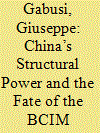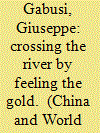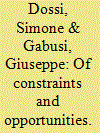|
|
|
Sort Order |
|
|
|
Items / Page
|
|
|
|
|
|
|
| Srl | Item |
| 1 |
ID:
176546


|
|
|
|
|
| Summary/Abstract |
In 2013, China and India officially established an economic corridor (the Bangladesh–China–India–Myanmar Economic Corridor, BCIM-EC) that would cut across Myanmar and Bangladesh. But while the formal process of cooperation among the four countries is in place, many obstacles to its implementation remain at the international, national and local levels. Is meaningful collaboration possible within the BCIM-EC framework? In terms of two dimensions of structural power as conceptualised by Susan Strange, security and trade, China’s structural power in Myanmar is much stronger than India’s. It is therefore likely that this imbalance will prevent the BCIM-EC project, which currently appears to be overshadowed by China’s Belt and Road Initiative, from having a fruitful outcome.
|
|
|
|
|
|
|
|
|
|
|
|
|
|
|
|
| 2 |
ID:
155241


|
|
|
|
|
| Summary/Abstract |
China's Belt and Road Initiative (BRI) is, above all, a connectivity project. As connectivity requires financial support, in the past few years China has undertaken several institution-building activities at the national and international level, mainly in the financial and economic sector, showing a new propensity to influence global economic governance. In particular, the establishment of the Asian Infrastructure Investment Bank (AIIB) has drawn attention worldwide. How does this institution-building process connect with BRI? Are these institutions just a vehicle for exporting China's capital and overcapacity, or do they signal a potential wider challenge to the post-World War II liberal international order? By analyzing the first loans approved by the bank, the present paper argues that far from representing a China-led challenge to the Western-led liberal order, the AIIB, while promoting Chinese commercial and geopolitical interests, shows the resilience of the global financial regime created by the West.
|
|
|
|
|
|
|
|
|
|
|
|
|
|
|
|
| 3 |
ID:
170386


|
|
|
|
|
| Summary/Abstract |
China's Belt and Road Initiative has been presented as a "win-win" opportunity, as countries involved would benefit from connectivity projects of mutual interest. As such, it should facilitate and improve the relationship between the European Union (EU) and China, long defined as a "strategic partnership". Instead, this article argues that the BRI—as an order-shaping exercise—has put the partnership under strain, enlarging the gap between a "win-win" rhetoric and the reality of frictions and contestations. By analysing the official discourse in EU documents, and comparing them with the dynamics that the BRI has been generating, especially in Central Europe and in the Western Balkans, the author comes to the conclusion that the EU–China relationship does not pass the test of a "strategic partnership", as defined in the literature. Thus, in order to reduce the possibility of increasing misunderstandings and growing suspicion, and to prevent a "lose-lose" final outcome—a common destiny that the international community should avoid—the way forward for the EU and China is to explore and discuss effectively what type of operational principles could sustain the partnership.
|
|
|
|
|
|
|
|
|
|
|
|
|
|
|
|
| 4 |
ID:
192170


|
|
|
|
|
| Summary/Abstract |
This article argues that a peculiar pattern of dependent asymmetry – ‘dual dependence’, i.e. a combination of internal and external dependence – has come to characterize the structure of China-Myanmar relations since the late 1980s. The hypothesis we present is that shifts in this pattern of dependent asymmetry account for fluctuations in China-Myanmar relations between 2011 and 2021. We test this hypothesis against empirical evidence from what we identify as two shifts in the structure of bilateral relations: for each, we trace how structural changes were perceived in Naypyitaw and Beijing, and how such perceptions oriented an adjustment in their respective policies. Myanmar’s reduced external dependence on China in 2011–2012 expanded the set of the potential courses of action available to Myanmar’s decision-makers and reduced the set of those available to China; conversely, the opposite happened in 2017–2018, following Myanmar’s return to full-fledged external dependence on China. The paper finally speculates that the military coup in 2021 could well represent a third shift in the structure of bilateral relations, further strengthening Myanmar’s external dependence on China and constraining the military government’s room of manoeuvre.
|
|
|
|
|
|
|
|
|
|
|
|
|
|
|
|
| 5 |
ID:
151446


|
|
|
|
|
| Summary/Abstract |
The year 2015 marked the 25th anniversary of the publication of Robert Wade's seminal book Governing the Market (GTM). In his book, Wade elaborates an approach stressing the role of the state in economic development. As the consequences of the Great Recession are forcing many governments and the International Financial Institutions themselves to put into question their ideological stance on unfettered free markets, the anniversary marks the occasion to review the concept of the developmental state (DS) through Wade's GTM approach and re-assess its validity in the twenty-first-century global political economy. Are policy measures historically implemented by the DS still feasible (and desirable) in a globalized era dominated by global value chains? With an eye to the peculiar Chinese experience in the past decades, the paper argues that the key principles in GTM – as properly understood – are still useful as policy prescriptions, as they show how developing countries could successfully start their economic take-off.
|
|
|
|
|
|
|
|
|
|
|
|
|
|
|
|
|
|
|
|
|